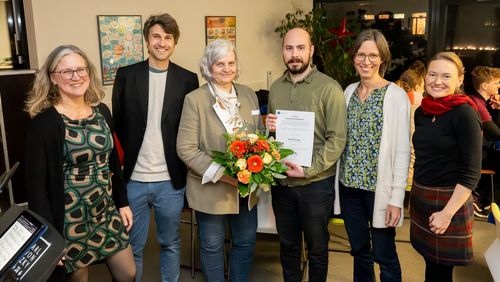Oldenburg physics student Kumar Ashish represents the interests of the approximately 370,000 international students in Germany. As a member of the Executive Committee of the German Academic Exchange Service (DAAD) and chairman of the Federal Union of International Students in Germany (BAS) he has already made a difference.
Kumar Ashish certainly gets around in Germany – as numerous photos on his smartphone show: selfies of the Oldenburg physics student with Federal Minister of the Interior Nancy Faeser and Education Minister Bettina Stark-Watzinger, pictures showing him at conferences, as a guest speaker or participant in a panel discussion at the Technical University of Munich, the University of Potsdam or the University of Jena. Ashish works tirelessly to draw attention to problems that make life difficult for international students in Germany – financing their studies, visa extensions, language certificates or meeting the requirements of the immigration authorities, for example.
His influence should not be underestimated: Ashish, who comes from Nepal and is studying Engineering Physics in Oldenburg, has been Chairman of the Federal Union of International Students since early 2019 and a student representative on the board of the German Academic Exchange Service (DAAD) since the end of 2020. He was recently confirmed in both posts. He spends a lot of time dealing with the associated tasks and also provides counselling to international students in Oldenburg on an informal basis. “My motivation is to solve problems and help the students,” he says.
“Kumar Ashish is incredibly well networked and extremely active,” says Katja Kaboth-Larsen from the university’s International Office. She has seen Ashish in action as a tutor in Oldenburg and at conferences as a participant in panel discussions, for example. The fact that a representative of the University of Oldenburg is so present in national forums has “a certain image-boosting effect”, she says. “Ashish comes up with many good ideas and is a good communicator – but also a good listener,” she adds.
A difficult beginning
Ashish himself had to overcome a number of hurdles before he was able to begin his studies in Germany in 2016. First, some important documents were stolen from him, then he failed crucial language tests several times, and finally Nepal was hit by a severe earthquake in 2015, which prevented certain letters of admission from reaching him in time. If he hadn't come across an understanding embassy employee who got him a visa in record time, he might have had to abandon his dream of studying physics in Germany altogether.
Nowadays, terms like “Überbrückungshilfe” (temporary financial support), “Ausländerbehörde” (foreigners’ office) and “Vorstandssitzung” (board meeting) come naturally to Ashish – he’s been involved in university politics since 2018, after all. The initial impetus came from a WhatsApp group for students on his degree course. “We were 80 students from different countries and all kinds of everyday problems were discussed in the group: How do I find a room? Where can I buy cheap shoes for the winter? What do I do if I receive an overdue notice?” he recalls. When he realised that other international students were grappling with many of these same questions, he decided to run for election to the student parliament. Then he used his mandate to offer regular counselling sessions in the rooms of the General Students' Committee (AStA) and to listen to international students talk about their worries and needs.
He soon realised that not all their problems could be resolved within the university. Some of the hurdles exist at the local authority level, others at the state level, and yet others at the national level. So Ashish decided to run for the post of chairman of the BAS, and little more than a year later he also became a member of the DAAD Executive Board. “This has given me an even better understanding of how things work,” he emphasises. The BAS can become politically active, whereas the DAAD, as a government body, wields influence in other areas, as well as offering many funding opportunities.
Germany needs the creativity and talents of international students
Kumar Ashish
There was a lot of work to do, especially during the four semesters of the pandemic. Many international students lost their jobs and were no longer able to finance their studies. They also faced the threat of losing their residence permit if they failed exams or fell behind on coursework requirements. As chairman of the BAS, Ashish campaigned for financial grants and an easing of the rules on the standard period of study. He also pushed for a recently passed law that increases the number of days that international students are allowed to work per year from 120 to 140 – making it a little easier for them to finance their studies.
He now sees it as fate that he ended up in Germany rather than the US, his original dream destination for studying. “It’s my job to make a difference here,” he says with conviction. Ashish is proud to be part of the University of Oldenburg and feels at home in Germany. He is currently completing a practical module in materials science at the University of Applied Sciences Emden/Leer, and plans to finish his bachelor’s thesis by the end of the year. Next on the agenda is his master's degree, which he also wants to do in Oldenburg.
At the political level, too, Ashish sees many tasks ahead of him to accomplish for international students. The obligation for international students in some states to prove they have 11,208 euros in a blocked account on a certain date each year creates too much mental pressure, he says, and the same goes for the fact that visas are issued for only a few months instead of the entire duration of studies. And why are German language courses often so expensive? he asks. “Many students from abroad gradually lose the motivation to stay in Germany after their Bachelor’s degree due to the uncertainty and the numerous bureaucratic hurdles, and then end up doing their master’s in another country instead,” Ashish explains. Yet Germany needs the creativity and talents of international students, he stresses. He would like to see a welcome culture that recognises this – with less pressure and more flexibility.






